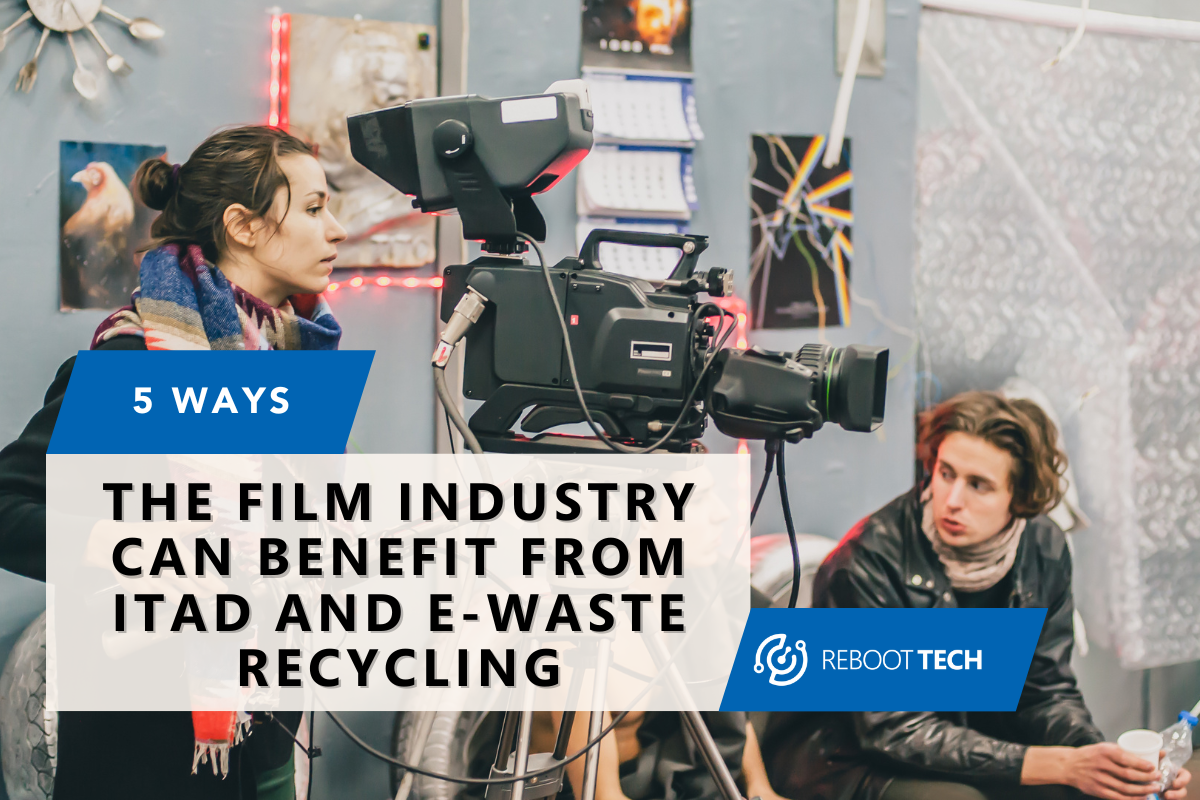
5 Ways The Film Industry Can Benefit From ITAD and E-Waste Recycling
The entertainment and film industry is immensely valued. We often come home from long days to escape reality for a bit to binge-watch our favorite comfort show or put on a nice movie. Looking behind the scenes though, the world of filmmaking is extremely fast-paced and is constantly having to evolve to the latest technology to keep up with consumer trends.

While this is generally a good thing, technological advancements also come with the inevitable accumulation of old and outdated electronics. This is bad because it leads to electronics surplus and e-waste, which can harm our environment, and human health and affect the studios’ business.
Fortunately, the film industry can reap numerous benefits from electronics recycling and IT Asset Disposition (ITAD) services. In this blog, we’ll go over how an entertainment/film business of any size could benefit from sustainable electronics recycling and IT Asset Disposition.
What Film Equipment Can We Recycle?
Before we get into the benefits and why Film and Creative Studios should work with an e-waste and ITAD provider, let’s get into some common film equipment that can be recycled.
- Cameras
- Lighting Equipment
- Sound and Audio Equipment
- Editing Consoles and Computers
- Projection and Display Devices

The Need For A Good ITAD and E-Waste Disposal Partner

Did you know that in 2023, the global e-waste generated was 57.4 million metric tons? Sadly, that number is projected to keep on growing as well. The damage e-waste does to our planet and health can be disastrous as well.
E-waste contains things such as lead, mercury, cadmium, and arsenic. If that stuff is disposed of incorrectly, it can lead to neurological issues, cancer, or other internal organ problems. According to the World Health Organization (WHO), children and pregnant women are the most vulnerable. If toxic materials leak into our soil and water, it can cause major pollution and kill off our wildlife as well.
Besides helping the planet and human health, having a good ITAD partner can help your business stay safe from hackers, and dispose of your data properly. Data security is crucial, especially with the increase in cyber attacks on film studios and creative industries.
All that stuff sounds scary, but it is preventable with a trusted partner. Here are five benefits for a Film business/studio:
Cost Savings
The first is cost savings. The filmmaking process involves a lot of moving parts. There are a lot of people on set such as Directors, producers, actors, some writers, gaffers, assistant directors, and many more talented individuals. That, and all the filmmaking equipment can lead to high expenses.
By recycling old electronics and partnering with ITAD providers, production companies can significantly reduce their overhead costs. Some places even offer buyback programs and you can get some money back from simply recycling the equipment that is no longer needed!
Instead of investing in brand-new equipment, refurbishing or repurposing old electronic devices can offer a cost-effective alternative without compromising quality. It also helps lower the cost of equipment in general. Since many places don’t recycle their e-waste, manufacturers end up having to mine for new resources, even though our old electronics have valuable materials and can be repurposed to make the ones. If our electronics are recycled, the cost of making our new electronics should go down as well, which helps individuals, and businesses alike.
Environmental Responsibility
Improper disposal of e-waste can lead to as many as 1000 different chemicals leaking into the environment. What doesn’t help is that e-waste is our fastest-growing waste stream in the world and is actually increasing 3 times faster than the world’s population.
The film industry, like any other sector, has a responsibility to minimize its environmental footprint. Electronics recycling and ITAD services play a crucial role in achieving this goal by diverting electronic waste from landfills and promoting responsible disposal practices.
The air pollution that is created by e-waste can impact certain animal species more than others, and if not treated properly, can lead to the extinction of some species. By recycling old equipment, film production companies can contribute to the conservation of natural resources and reduce harmful greenhouse gas emissions.
Doing things such as camera recycling or disposing of lighting equipment, can help out the environment while clearing out storage in an environmentally friendly way.

Data Security
There are a lot of cyber attacks, particularly in the film and creative industry. People want to be able to access confidential files, blackmail, pirate information, or other malicious intent. For example, there was a Sony Pictures hack back on November 24, 2014, from a group called “The Guardians of Peace”.
This infamous hack led to the release of private information of employees, and emails; threats were even being made against releasing a movie called, “The Interview” by Seth Rogen and James Franco. Reports state that more than 100 terabytes of data were stolen from Sony, many of which, were released to the public.

Most recently, Insomniac Games, a gaming entertainment company, was hacked back in December 2023. Hackers threatened to release private data unless they were paid $2 million. The company refused to pay the blackmail, and millions of files were posted online which included future game leaks, employee data, and a full, unreleased game released to the public. This hurt the company’s reputation and most likely, future sales.
When disposing of old electronic products, ensuring the complete and secure destruction of data is essential. ITAD providers offer specialized services to wipe data from devices securely, minimizing the risk of data breaches or leaks. This is done in many different ways such as purging, cleansing, and physical destruction.
The types of destruction vary depending on how sensitive the information is. By partnering with reputable ITAD vendors, film production companies can protect their sensitive data and protect their reputations.
Compliance with Regulations
The next thing is something that many businesses can often overlook, which is being compliant with regulations. Many states have specific rules you need to follow in terms of recycling. If those mandates aren’t met, then businesses can be met with a fine!
The film industry is particularly vulnerable since electronics are dealt with all the time, and it can be hard to have proper waste management for old devices. Dealing with this one on your own can seem like a hassle, which is why it’s necessary to have a trusted partner take care of the recycling process for you, to make sure you don’t have to worry about those regulations.
Many regulations such as California’s Senate Bill 20 have certain requirements that need to be met, and it can get complicated. Your ITAD and e-waste partner should be knowledgeable about all those regulations and help you out in the best way possible.
Equipment Upgrades
Innovation is the lifeblood of the film industry, driving continuous improvements in equipment and technology. We’ve seen it evolve constantly from green screens to one of the newest inventions, such as “The Volume”, which is a 360-degree backdrop, similar to a green screen, but more immersive.
Technology like this makes the filming process easier and more enjoyable for the consumers. However, there is a concern that since upgrades are happening so often, the old devices pile up, causing an electronic surplus.

Nobody wants this issue preventing the entertainment industry from evolving though. This is why an ITAD and e-waste provider can help film production companies future-proof their operations and maintain a competitive edge in the industry while making sure that the old devices are dealt with sustainably.
The Invaluable Benefits
Electronics recycling and ITAD offer invaluable benefits to the film industry. From cost savings and environmental responsibility to data security and regulatory compliance, the advantages are undeniable. By incorporating these practices into their operations, film production companies can not only reduce their environmental impact but also enhance their efficiency, security, and overall sustainability.





